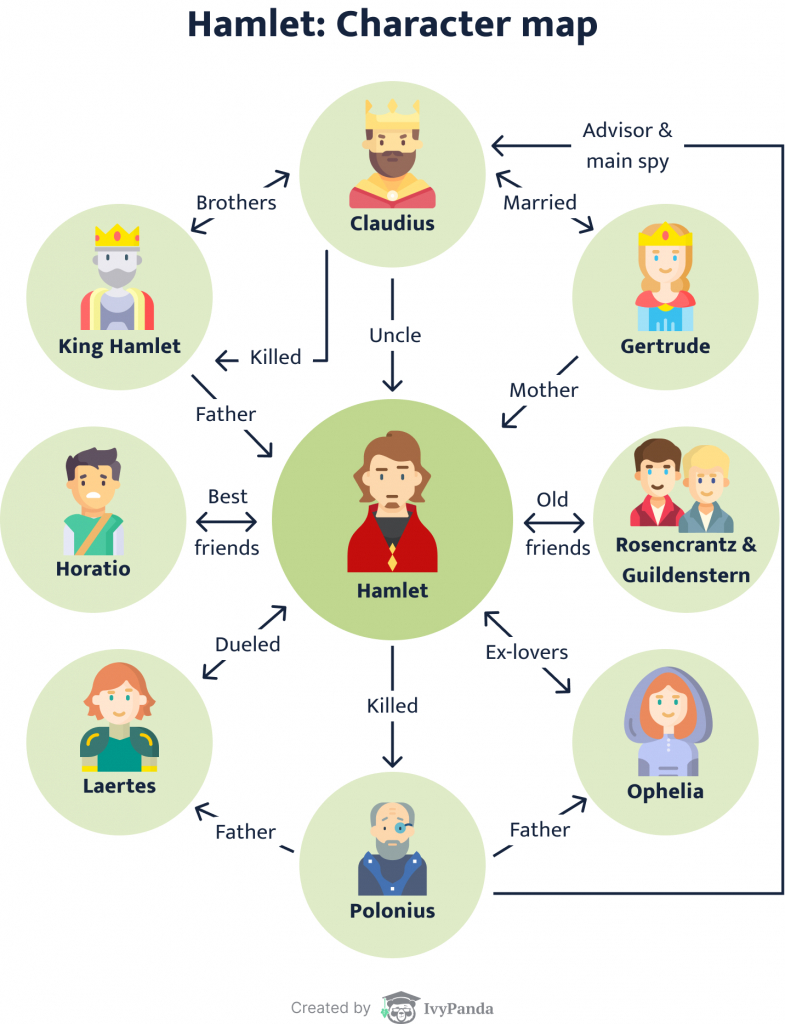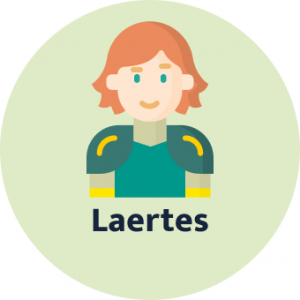Understanding complicated relationships in Hamlet is very easy with a Hamlet character map. It visually lays out the ties between the major and minor heroes, helping you comprehend the complex dynamics of loyalty and betrayal.
At the center of our character map of Hamlet, you will find the Prince himself. Surrounding him are other pivotal figures from the play, including:
- Claudius, the new king and Hamlet’s uncle
- King Hamlet, who visited his son as a ghost to tell him how he was killed
- Gertrude, Hamlet’s mother, caught between her son and her new husband
- Ophelia, whose tragic fate highlights themes of innocence and manipulation
The map showcases the key Hamlet characters list so rest assured you won’t miss anything! Figures like Polonius, Laertes, Rosencrantz, and Guildenstern are also in the Hamlet character chart as they play vital roles in advancing the narrative. Check it out to see how each of them reveals broader themes, from political intrigue to familial bonds.
📍 Hamlet Character Map
As there are plenty of important characters in Hamlet, we’ve created this map. It shows all the key relationships and connections of the play.

📌 How many characters die in Hamlet?
There are nine victims: King Hamlet, Polonius, Ophelia, Rosencrantz, Guildenstern, Laertes, Gertrude, Claudius, and Prince Hamlet.
📌 Who does Hamlet kill?
He stabs Polonius, Claudius, and Laertes. Moreover, Hamlet orders the King of England to kill Rosencrantz and Guildenstern, two friends from his childhood who betrayed him.
😔 Hamlet

Hamlet is the protagonist of the play. He is the Prince of Denmark who studies at the University of Wittenberg. His parents are the recently departed King of Denmark and Gertrude. After his father’s death, Gertrude marries Claudius, Hamlet’s uncle, who becomes his stepfather as well. Prince Hamlet is existentialistic and immature, which makes his personality complex and controversial.
Hamlet Character Analysis
Hamlet is one of the most complicated characters in Western literature. His indecisiveness and never-ending doubts make him a unique figure that perfectly fits the entire concept of the play.
Hamlet is lost in his thoughts and intentions. On the one hand, he is a well-educated and ambitious young man. He studies at the university and absorbs progressive views and ideas. On the other hand, his indecisiveness kills him from the inside. Being lost in his doubts, Hamlet suffers during the entire play and makes plenty of impulsive decisions.
Hamlet’s tragic flaw starts from the moment of his meeting with the Ghost. During the entire play, this spirit appears several times to Marcellus, Bernardo, and Horatio. However, the Ghost is silent with them. Only in the last scene of the first act, while being alone with Hamlet, he first speaks. He claims that Claudius is the murderer. He poisoned Hamlet’s father to marry Gertrude and take the throne. Thus, the Ghost commands Hamlet to revenge. However, Prince is not sure about his further actions. Numerous doubts appear in his head. So, instead of avenging his father right away, Hamlet starts his long investigation.
During the entire play, Hamlet acts inadequately. Does it mean that he is indeed mad? Who knows. He claims that he pretends to be insane. Anyway, it helps Prince fool everyone around to reveal the truth about his dad’s death.
With the progress of the plot, Hamlet changes his attitude towards the surrounding people. He realizes that his old friends agree to spy on him, which makes Prince even more frustrated about life. Moreover, Hamlet does not understand his mother, who married Claudius right after his father’s demise. As a result, he considers women two-faced and deceptive. Even innocent Ophelia, a puppet of Claudius and Polonius, suffers from Hamlet’s humiliation.
The scene with Yorick’s skull is crucial for Hamlet’s character analysis. Here Prince analyzes the essence of life and death and realizes that in the end, the human body inevitably decays, and the soul passes away. He realizes that committing suicide is the wrong way to get rid of the problems. Hamlet is afraid of death and of the uncertainty of what happens with the soul after demise.
Ultimately, Hamlet is stabbed by Laertes with a sword secretly poisoned by Claudius and dies in the last scene. However, Hamlet’s character traits like indecisiveness and impulsiveness were killing him emotionally since Act 1.
💬 Hamlet’s Quotes
O most wicked speed, to post
Hamlet, Hamlet, Act I, Scene 2
With such dexterity to incestuous sheets!
It is not nor it cannot come to good
But break my heart, for I must hold my tongue.
There are more things in heaven and earth, Horatio
Hamlet, Hamlet, Act I, Scene 5
Than are dreamt of in your philosophy.
To be or not to be, that is the question
Hamlet, Hamlet, Act III, Scene 1
Whether ‘tis nobler in the mind to suffer
The slings and arrows of outrageous fortune
Or to take arms against a sea of troubles
And by opposing, end them.
I essentially am not in madness
Hamlet, Hamlet, Act III, Scene 4
But mad in craft.
No, faith, not a jot; but to follow him thither,
Hamlet, Hamlet, Act V, Scene 1
with modesty enough and likelihood to lead it, as
thus: Alexander died, Alexander was buried, Alexander
returneth into dust; the dust is earth; of earth
we make loam; and why of that loam, whereto he
was converted might they not stop a beer barrel?
Imperious Caesar, dead and turned to clay,
Might stop a hole to keep the wind away.
O, that that earth which kept the world in awe
Should patch a wall t’ expel the winter’s flaw!
🦹♂️ Claudius in Hamlet

Claudius is the new King of Denmark, Hamlet’s uncle and stepfather. He marries the Queen right after Hamlet’s dad’s death and takes the throne. What’s more, Claudius is a villainous and lecherous antagonist of the play. His confrontation with Hamlet is one of the most dynamically developing conflicts of the tragedy.
Claudius Character Analysis
William Shakspeare depicts Claudius as the main villain in Hamlet. He is a man full of cunning and meanness. Claudius’s immorality reaches its peak when he kills his brother to become the new King, which happens even before the events of the play.
Moreover, Claudius is a crafty politician. He skillfully manipulates people around to find benefits for himself. He pretends to be a responsible governor who saved Denmark in the period of darkness and uncertainty after the King’s death. Therefore, all the people, except for Hamlet, perceive him as a savior. But is he a savior in reality? No. Claudius is a mean manipulator who becomes a reason for corruption, deception, and spying. Thus, there is only one real King in Hamlet – Hamlet’s father. Claudius only pretends to be a national hero when in fact, he is a selfish villain.
Shakespeare masterfully conveys Claudius’s spoiled personality by describing the atmosphere in the country. The author notes that the weather is terrible:
Something is rotten in the state of Denmark
Hamlet, Marcellus, Act I, Scene 4
Hence, Claudius’s presence negatively affects everything around him and covers the state with the dark veil.
Even though Claudius is a professional manipulator, he makes one mistake that becomes fatal for him. While watching the performance, his reaction to the scene from The Murder of Gonzago showed that he was guilty of the murder. It’s the first time an audience sees how he actually feels: Claudius doesn’t regret killing Old Hamlet, but he’s terrified of being caught. Hamlet notices this suspicious reaction and realizes that his uncle is a murderer. Prince decides to revenge.
Does Hamlet kill his uncle? Yes. He stabs Claudius with the poisoned sword and makes him drink the poisoned wine.
To sum Claudius’s character analysis up, he is an explicit representation of evil and villainy in the play. His mean nature becomes the reason for his confrontation with Hamlet and results in numerous deaths of innocent characters.
💬 Claudius’ Quotes
Madness in great ones must not unwatched go.
Hamlet, Claudius, Act III, Scene 1
How smart a lash that speech doth give my conscience!
Hamlet, Claudius, Act III, Scene 1
The harlot’s cheek, beautied with plast’ring art,
Is not more ugly to the thing that helps it
Than is my deed to my most painted word.
O heavy burden!
Oh, my offense is rank. It smells to Heaven.
Hamlet, Claudius, Act III, Scene 3
It hath the primal eldest curse upon ’t,
A brother’s murder.
My words fly up; my thoughts remain below.
Hamlet, Claudius, Act III, Scene 3
Words without thoughts never to heaven go.
Oh, this is the poison of deep grief. It springs
Hamlet, Claudius, Act IV, Scene 5
All from her father’s death, and now behold!
O Gertrude, Gertrude,
When sorrows come, they come not single spies
But in battalions.
👑 Gertrude in Hamlet

Gertrude is the Queen of Denmark and Hamlet’s mother. She marries her dead husband’s brother, Claudius, very soon after her first husband’s demise. As a result, Hamlet accuses her of being cruel and lustful. Gertrude is a loving mother and a smart woman. However, because of her dependence on men, she is incapable of taking any serious steps.
Gertrude Character Analysis
Queen Gertrude is one of the most complex characters in the play. Her status in society does not allow her to be an independent woman. In Shakespeare’s time, women did not have enough freedom. They were supposed to be entirely dependent on a protective man. Therefore, Gertrude marries Claudius very soon after the death of the King. The new marriage gives her social security and protection. So, we can assume that Gertrude did not have any other choice. A wedding was essential for her to preserve her high social status.
Nevertheless, Hamlet shames his mother. He claims that she is obscene, lustful, and opportunistic. Being too impressed by a newly-formed couple, Hamlet generalizes all the females. He starts thinking that all the women are vicious and “dirty,” so he acts cruelly towards his mother and Ophelia. Thus, the conflict between Hamlet and Gertrude affects other characters as well.
Speaking about the relationship between Gertrude and Ophelia, it is worth noting that there is tension between these two women. Both of them love Hamlet in their own way. However, they still share one beloved man. This plants the seeds for internal misogyny.
The gap between Hamlet and Gertrude became even deeper in Act 3 Scene 4. When being in one room, Hamlet sees the Ghost, while his mother does not. After that, Gertrude may perceive her son as insane and not believe that Claudius is a murderer. Or it can be said that she helps Hamlet by claiming that he’s gone crazy.
Gertrude’s reaction to the scene of The Murder of Gonzago also proves that she is unaware of Claudius’s guilt. The Queen is upset when she sees his anxiety. However, she just cares about Claudius’s mental state, not even suspecting him of being a villain.
Another crucial element of Gertrude’s character analysis is her demise. The Queen drinks poisoned wine that Claudius prepared for Hamlet. There are two options:
- She does it knowingly to self-sacrifice herself for Hamlet. This action depicts her as an example of a loving and caring mother.
- She isn’t aware of the wine being poisoned and drinks it by accident.
Either way, her death is as tragic as other events of the play.
💬 Gertrude’s Quotes
Good Hamlet, cast thy nighted color off,
Hamlet, Gertrude, Act I, Scene 2
And let thine eye look like a friend on Denmark.
Thou know’st ’tis common. All that lives must die,
Hamlet, Gertrude, Act I, Scene 2
Passing through nature to eternity.
What have I done, that thou darest wag thy tongue
Hamlet, Gertrude, Act III, Scene 4
In noise so rude against me?
Thou turn’st mine eyes into my very soul,
Hamlet, Gertrude, Act III, Scene 4
And there I see such black and grainèd spots
As will not leave their tinct.
There, on the pendent boughs her coronet weeds
Hamlet, Gertrude, Act IV, Scene 7
Clambering to hang, an envious sliver broke;
When down her weedy trophies and herself
Fell in the weeping brook.
Her clothes spread wide;
And, mermaid-like, awhile they bore her up:
Which time she chanted snatches of old tunes;
As one incapable of her own distress,
Or like a creature native and indued
Unto that element: but long it could not be
Till that her garments, heavy with their drink,
Pull’d the poor wretch from her melodious lay
To muddy death.
🌹 Ophelia in Hamlet

Ophelia is the daughter of Polonius, Laertes’s sister, and Hamlet’s former object of interest. She is a tender lady that sincerely loves Prince and obeys her father. She is involved in Claudius’s and Polonius’s evil plan against her will. Moreover, she suffers from Hamlet’s mistreatment. Overall, Ophelia is used by men multiple times, which causes her many sufferings.
Ophelia Character Analysis
Ophelia’s character analysis should start with the fact that she was in the middle of the confrontation between Hamlet and Polonius. The woman truly loves Prince. Her feelings are genuine and sincere. However, her father and brother are against Hamlet and Ophelia’s relationship. Therefore, they demand that she cuts off all her interactions with Prince. Being a loyal daughter, Ophelia obeys her father’s command.
Later, Claudius and Polonius use Ophelia to figure out Hamlet’s intentions. They command her to have a conversation with him while they would spy for them. Ophelia meets Hamlet. Prince acts inadequately and accuses her of being two-faced and deceptive. The innocent Ophelia is shocked and confused because Hamlet hurts her sincere feelings towards him.
Ophelia’s storyline ends tragically. Her father dies, and it is Hamlet who has stabbed him. Being incapable of resisting stress, Ophelia goes mad. The scene where she sings snatches of songs and handing out flowers proves her insanity. Ultimately, she commits suicide by drowning in a brook.
Hamlet’s reaction to Ophelia’s death is quite surprising. He mourns and expresses deep grief. Thus, we can assume that Hamlet loved Ophelia, despite being too rude to her.
Overall, Ophelia’s positive character traits contradict the harsh realities of the real world. Being incapable of resisting complex trials, she finds a way to escape the problems – commits suicide.
🕵️ Polonius in Hamlet

Polonius is Claudius’s advisor and the father of Laertes and Ophelia. He pretends to be a decent human being and a good parental figure. However, in reality, Polonius fails to be a righteous man and a caring father. He is involved in Claudius’s evil plan. Moreover, his silly advice and decision to spy upon his children make him a bad parent.
Polonius Character Analysis
Polonius’s character traits are shadiness, cunning, and shrewdness. Therefore, he is a perfect advisor for Claudius. Throughout the play, Polonius assists the King in hiding his guilt and spying upon Hamlet, attempting to win the monarchs’ favor. He masterfully manipulates Ophelia, disregarding basic moral norms for his own benefit. However, Polonius does not succeed. He fails to find the roots of Hamlet’s madness and, therefore, misleads the King.
An essential element of Polonius’s character analysis is his performance as a parent. Polonius is too concerned about his children’s reputation. Thus, he tries to do his best to prevent Ophelia and Laertes from shame. But are his recommendations to his kinds actually valuable? Not really.
Being concerned about Hamlet’s mental state, Polonius forbids Ophelia to be in a romantic relationship with him. Naturally, this hurts her feelings because she is sincerely in love with Prince. Yet, being an obedient daughter, she follows her dad’s command. Moreover, Polonius gives Laertes hypocritic and full of generic aphorisms advice on how to act, dress, spend money, interact with people, etc. The irony in Polonius’ speech to Laertes is that he gives good recommendations. However, the father himself fails to implement these pieces of advice in his own life.
Polonius’s demise in Hamlet is quite unexpected. He was hiding behind the tapestry while spying upon Hamlet and Gertrude. Prince heard some noises and became furious about being an object of spying. He stabs the tapestry and Polonius, not even knowing who is standing here.
💬 Polonius’ Quotes
In few, Ophelia,
Hamlet, Polonius, Act I, Scene 3
Do not believe his vows, for they are brokers,
Not of that dye which their investments show,
But mere implorators of unholy suits,
Breathing like sanctified and pious bawds
The better to beguile.
See you now,
Hamlet, Polonius, Act II, Scene 1
Your bait of falsehood take this carp of truth,
And thus do we of wisdom and of reach,
With windlasses and with assays of bias,
By indirections find directions out.
Therefore, since brevity is the soul of wit,
Hamlet, Polonius, Act II, Scene 2
And tediousness the limbs and outward flourishes,
I will be brief. Your noble son is mad.
Madam, I swear I use no art at all
Hamlet, Polonius, Act II, Scene 2
That he’s mad, ’tis true, ’tis true ’tis pity,
And pity ’tis ’tis true—a foolish figure,
But farewell it, for I will use no art.
He knew me not at first; he said I
Hamlet, Polonius, Act II, Scene 2
was a fishmonger. He is far gone. And truly, in my
youth, I suffered much extremity for love, very near
This.
💢 Laertes in Hamlet

Laertes is Polonius’s son and Ophelia’s brother, who studies at a university in France. He is the man of action, while Hamlet, in contrast, is the man of doubts. This confrontation of Hamlet vs. Laertes is vivid throughout the entire play and adds more dynamic to the plot development.
Laertes Character Analysis
William Shakspeare describes Laertes as a worldly, gallant, hotheaded young man who is obsessed with his family’s honor. He is a loving, protective, though controlling brother for his sister Ophelia. Thus, he supports Polonius in his decision to limit her interactions with Hamlet.
Laertes’s relationship with his father is rather controversial. On the one hand, Polonius takes care of his son, giving him suggestions on how to live life properly. On the other hand, Polonius’s advice to Laertes is too hypocritic. Moreover, the father orders to spy upon his son while he is leaving for his studies in France.
Conducting Laertes’s character analysis, it is worth mentioning that he is Hamlet’s foil. Both of them get into the same situating – they want to revenge for their relatives’ deaths. However, if Hamlet broods over the murder, Laertes takes immediate action. He gets mad after learning about Ophelia’s and Polunius’s deaths and seeks instant revenge.
Laertes’s storyline ends tragically as well. Hamlet wounds him with the poisoned blade that Claudius prepared to kill Prince. Laertes dies. However, before his demise, he forgives Hamlet and asks for forgiveness himself. Laertes realizes Claudius’s guilt and justifies Prince for his cruel actions towards the King, Polonius, and himself.
💬 Laertes’ Quotes
Be wary then, best safety lies in fear.
Hamlet, Laertes, Act I, Scene 3
Youth to itself rebels, though none else near.
How came he dead? I’ll not be juggled with.
Hamlet, Laertes, Act IV, Scene 5
To hell, allegiance! Vows, to the blackest devil!
Conscience and grace, to the profoundest pit!
I dare damnation. To this point I stand,
That both the worlds I give to negligence,
Let come what comes, only I’ll be revenged
Most thoroughly for my father.
Too much of water hast thou, poor Ophelia,
Hamlet, Laertes, Act IV, Scene 7
And therefore I forbid my tears.
Lay her i’ th’ earth,
Hamlet, Laertes, Act V, Scene 1
And from her fair and unpolluted flesh
May violets spring! I tell thee, churlish priest,
A minist’ring angel shall my sister be
When thou liest howling.
I am justly killed with mine own treachery.
Hamlet, Laertes, Act V, Scene 2
📜 Horatio in Hamlet

Horatio is Hamlet’s best friend. Unlike his other acquaintances Rosencrantz and Guildenstern, who betray Prince, Horatio is a faithful friend. He is the only person in the play who is aware that Hamlet’s madness is fake.
Horatio Character Analysis
Horatio appears in the very first scene of the play and demonstrated himself as a person with a clear mind. He is skeptical towards superstition. Yet, he actually sees the Ghost. This lets the reader ensure that the spirit actually exists; it is not the fruit of someone’s madness. Horatio interprets the Ghost’s appearance as a warning sign and claims that it is the King’s wish to talk to his son.
Hamlet and Horatio are two characters that overcome all the obstacles together throughout the entire story. They share the same academic background and enjoy having intellectual conversations. However, if Hamlet starts acting impulsively in the middle of the play, Horatio remains careful and cautious till the very end.
Hamlet admires Horatio for his faithfulness, self-control, and prudence. Horatio values Hamlet as a friend and is always ready to support him even if it involves certain sacrifices. Some of Horatio’s character analyses present a theory that he is in love with Hamlet. However, we cannot see any clear evidence for that in the play. So, it is obvious that they are connected by true friendship. Their romantic relationship, however, remains an unrevealed secret.
Horatio in Hamlet remains alive. He has a concrete mission – to tell people the true story of Prince and reveal Claudius’s villainy.
💬 Horatio’s Quotes
Now, sir, young Fortinbras,
Hamlet, Horatio, Act I, Scene 1
Of unimprovèd mettle hot and full,
Hath in the skirts of Norway here and there
Shark’d up a list of lawless resolutes
For food and diet to some enterprise
That hath a stomach in ‘t; which is no other
(As it doth well appear unto our state)
But to recover of us, by strong hand
And terms compulsatory, those foresaid lands
So by his father lost.
These are but wild and whirling words, my lord.
Hamlet, Horatio, Act I, Scene 5
If your mind dislike any thing, obey it. I will forestall their
Hamlet, Horatio, Act V, Scene 2
repair hither, and say you are not fit.
Now cracks a noble heart. Good night, sweet prince,
Hamlet, Horatio, Act V, Scene 2
And flights of angels sing thee to thy rest!…
Not from his
Hamlet, Horatio, Act V, Scene 2
mouth,
Had it the ability of life to thank you.
He never gave commandment for their death.
But since, so jump upon this bloody question,
You from the Polack wars, and you from England,
Are here arrived, give order that these bodies
High on a stage be placed to the view,
And let me speak to the yet unknowing world
How these things came about. So shall you hear
Of carnal, bloody, and unnatural acts,
Of accidental judgments, casual slaughters,
Of deaths put on by cunning and forced cause,
And, in this upshot, purposes mistook
Fall’n on th’ inventors’ heads. All this can I
Truly deliver.
⚓ Fortinbras in Hamlet

Fortinbras is Prince of Norway in Hamlet. His father died as a result of a bet with Hamlet’s father. After that, Fortinbras’s uncle became the new King of Norway. So, the situation is very similar to Hamlet’s. However, they respond to the circumstances in entirely different ways.
Fortinbras Character Analysis
Even though Fortinbras makes only two brief appearances in the last acts of Hamlet, he plays a crucial role. Shakespeare describes him as another Hamlet’s foil.
To avenge his father’s death, Fortinbras consistently acts. He raises an army to reclaim Norway’s lost territories and conquer new ones. Hamlet, in contrast, sits around contemplating life and death. Hence, Fortinbras and Hamlet are two contrasting characters despite their life stories being very much alike.
What does young Fortinbras want to do?
The Prince of Norway is driven by the desire to restore the honor of his family. He plans to invade Denmark and pursue the land his father lost before he died. However, Fortinbras’s uncle prohibits him from doing so. Thus, the Prince of Norway attacks Poland. This land does not have much value for Fortinbras. Yet, he still invades Poland to restore his father’s honor as much as he can.
At the end of the play, Fortinbras becomes the new King of Denmark. Hamlet ultimately approves his candidacy to take the throne because Fortinbras has a clear mind, good leadership skills, and sanity.
👨🏻🤝👨🏿 Rosencrantz and Guildenstern in Hamlet

Rosencrantz and Guildenstern are old Hamlet’s friends from school. They are dishonest and immoral since they agree to be involved in Claudius’s evil plan. Their villain nature leads them to a tragic death.
Rosencrantz and Guildenstern Characters Analysis
Rosencrantz and Guildenstern in Hamlet are always described as one character. It seems that they are incapable of existing separately. They lack competence and critical thinking skills to function independently from each other.
When Claudius orders them to spy upon Hamlet, they instantly agree because it’s an excellent opportunity for them to gain the King’s respect. However, Prince sees right through them. Their reckless action and mature behavior become a reason for Hamlet’s mockery.
Conducting Rosencrantz and Guildenstern’s character analysis, it is with mentioning how they passed away. When Hamlet learns that they betrayed him, he immediately makes a decision to kill his former friends. It contrasts the way Prince hesitates whether to kill Claudius or not during the entire play. Hence, Hamlet’s impulsive and quick decision to get rid of his ex-friends proves that Rosencrantz and Guildenstern are unworthy and sneaky people.
👻 The Ghost in Hamlet

The Ghost in Hamlet is a mysterious figure that appears multiple times in the play, but not everyone sees it. The characters assume that he is the spirit of the recently departed King Hamlet. He comes to the city to tell an important message to his son.
The Ghost Character Analysis
The Ghost appears multiple times in the play. The witnesses assume that this is Old Hamlet’s spirit because the Ghost’s physical appearance and speaking manner were very similar to those of Old Hamlet.
The first ones to see the Ghost are Bernardo, Marcellus, and Horatio. However, it does not say a single word to them. Later, the spirit of the dead father appears to Hamlet. Only when the Ghost stays one-on-one with Hamlet, it starts speaking.
Old Hamlet’s ghost claims that he was poisoned by his brother, Claudius. Therefore, the spirit commands Hamlet to revenge. Moreover, after Claudius took the throne, Denmark weakened. Claudius planted seeds for corruption and political instability within the state. So, Hamlet’s mission is to dethrone his uncle and revenge him for his dad’s death.
According to Catholic traditions, the King’s soul will enter neither heaven nor hell until all the problems are resolved. As Old Hamlet states, his spirit is trapped in purgatory, so the son needs to release his father’s soul as soon as possible.
There are multiple theories about the origins of the Ghost. Some people believe it is the devil, while others claim that people see the spirit because of mass hysteria. Another group of characters supposes that the Ghost is just the fruit of Hamlet’s insanity. However, we, the readers, can conclude that the spirit actually appears. The Ghost symbolizes unsolved problems and the troubles coming to Denmark after the King’s death.
👣 Minor Characters in Hamlet
Osric
So, who is Osric in Hamlet, who appears once in the play? He is the silly courtier whom Claudius sent to summon Prince to a duel with Laertes. The readers meet Osric in Hamlet in Act 5 Scene 2. His irritating behavior annoys Prince and Horatio. Hamlet mocks Osric because the courtier is uneducated and corrupted.
Yorick
If you are trying to understand who Yorick in Hamlet is, we’re here to help. He was the king’s jester. Prince remembers him from his childhood because he told a lot of funny jokes. The readers learn about Yorick in Hamlet’s Act 5 Scene 1 when the gravediggers find his skull. There are no specific details on how Yorick died. However, after this discovery, Hamlet questions the essence of human existence. Prince realizes the human body will inevitably decay, which makes him even more frustrated about the meaning of life.
First Player
The first player is the main actor of the troupe that performs at Elsinore. Hamlet asks him to mirror his father’s death so that he can watch Claudius’s reaction. The first player appears in the play in Act 2 Scene 2.
The Players
The players are the members of the troupe that comes to perform at Elsinore. They agree to modify their play, so Hamlet can trace Claudius’s reaction and prove his quilt. The players appear in Act 2 Scene 2.
Gravediggers (First Clown and Second Clown)
Gravediggers are two men who accidentally discover Yorick’s skull while digging a grave for Ophelia. They have a conversation about the fate of dead souls, the ridiculousness of funerary rites, and the nature of death. They appear in the play only once, in Act 5 Scene 1.
Marcellus
Marcellus in Hamlet is a midnight guard. He and his colleague Barnardo are the first people at the castle Elsinore who see the Ghost. He also convinces Horatio to join them and witness the Ghost the other night. Marcellus appears in Act 1 Scenes 1, 2, 4, and 5.
Barnardo
Barnardo in Hamlet is Marcellus’s companion. The critical aspect of his appearance in the play is what Bernardo had seen at a prior watch before the protagonist arrived. It was the Ghost of Old Hamlet. Barnardo appears in Act 1 Scenes 1, 2, 4, and 5.
Francisco
Francisco is a guard at the castle of Elsinore who expresses his sadness about his work during cold hights. He appears only one in the play – in Act 1 Scene 1.
Voltemand
Voltemand is a courtier at Claudius’s court. He has a critical mission: to go to Norway with his colleague Cornelius to warn the King of Norway about the threats that his nephew Fortinbras causes to Denmark. He appears in the play in Act 1 Scene 2 and Act 2 Scene 2.
Cornelius
Cornelius is a courtier at Claudius’s court who accompanies Voltemand to Norway. Cornelius and Voltemand successfully complete their mission and inform the King of Norway about Fortinbras’s intentions towards Denmark. Just like Voltemand, Cornelius appears in Hamlet in Act 1 Scene 2 and Act 2 Scene 2.
Reynaldo
So, who is Reynaldo in Hamlet exactly? The audience learns that he is Polonius’s servant. However, what he does is a bit unusual. Reynaldo goes to Paris because Polonius commands him to spy upon his son. The readers can meet Reynaldo in Hamlet only in Act 2 Scene 1.
Captain
A captain is a commander in Fortinbras’ army. Fortinbras commands him to get the license from Claudius that would allow the soldiers to stay in Denmark. He appears in Act 4 Scene 4.
Priest
Priest, also known as the Doctor of Divinity, appears in Act 5 Scene 1 of the play. He discusses the doubtfulness of death.
Thanks for reading the article! For more information about Hamlet, check the links below.
